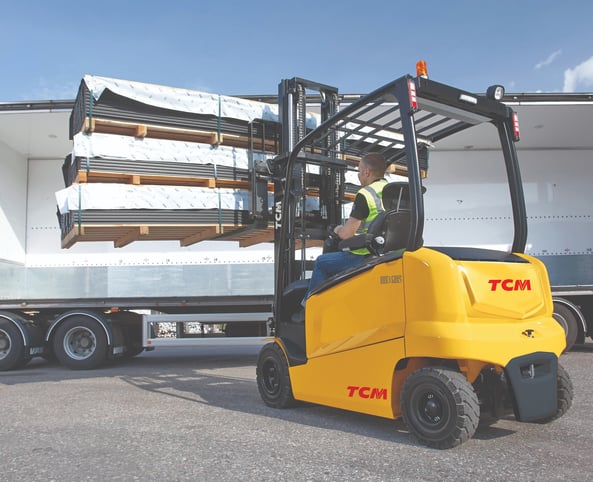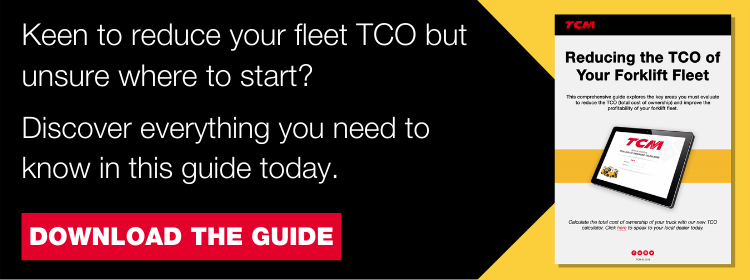Share Article

The challenges associated with material handling are growing, with forthcoming legislation driving change in regard to EU directives, emissions regulations, and fleet electrification. At TCM, we’re committed to helping you navigate that change and prepare for the future.
Change can be intimidating due to fear of the unknown. It can also present a number of business challenges. However, for organisations looking to future-proof their operations and gain a long-term competitive advantage, there are steps you can take to help mitigate these.
Having a thorough understanding of your current operation and associated costs is the best place to start.
Read on to discover the top three future challenges associated with material handling and how you can prepare.
1. EU directives impacting the cost of diesel trucks
One key challenge is forthcoming legislation driving change through EU directives (such as the 2030 ban on petrol and diesel engines), which will impact the cost of diesel trucks. In addition, for the first time, LPG trucks will also be covered in the new legislation.
Fortunately, at TCM, we already have a closed-loop system in place. This means our trucks’ engines already contain elements that ensure they meet the Stage V directives. However, the growing need to develop new engines to meet these directives represents a substantial increase in cost, not only to TCM, but to all manufacturers.
At TCM, we take a consultative approach to helping you identify the right solution for your business. This includes highlighting the available opportunities to optimise your fleet, rather than simply replacing existing trucks.
Related Read: Why TCM’s Dealer Network is Built on Customer Partnerships
2. Stage V emission regulations
Emissions regulations represent another future material handling challenge that businesses must prepare for. But what is Stage V and what does it cover?
On 14th September 2016, the European Commission issued Stage V emission regulations, building upon existing regulations (Stages I to IV). Stage V includes the following:
Directive 2016/1628, replacing Directive 97/68 EC and its amendments. Object (among others):
- 1 NRCI - Compression ignited (diesel) engine for non-road mobile machinery
- 2 NRSI - Spark-ignited (LPG, gasoline) engine for non-road mobile machinery (forklifts belong to these groups)
- 1 NRCI - Compression ignited (diesel) engine for non-road mobile machinery
- 2 NRSI - Spark-ignited (LPG, gasoline) engine for non-road mobile machinery (forklifts belong to these groups
The Stage V regulation also introduced a new limit for particle number emissions. The PN (particle number) limit is designed to ensure that a highly efficient particle control technology — such as wall-flow particulate filters (DPF) — can be used on all affected engine categories.
In addition, the Stage V regulation tightened the mass-based PM limit for several engine categories, from 0.025 g/kWh to 0.015 g/kWh.
But what does all of this mean in practice?
For diesel engines, DPF will be mandatory, together with other technologies in order to meet regulations. As a result, TCM expects a significant increase in the cost of current engines, although this will vary depending on the truck model. This will ultimately accelerate the trend towards electrification.
LPG engines will also be affected by Stage V. However, as our current engines already meet USA and Japan's regulations, we anticipate the adaptation to Stage V won’t drastically increase engine costs. If you’re currently operating diesel-powered trucks, we’d encourage you to consider LPG to reduce your business’ emissions.
Related Read: How Much Will the Electrification of Your Forklift Fleet Cost?
3. Fleet electrification
Fleet electrification is at the forefront of many operations managers’ minds. This also represents a significant challenge for many businesses. With such a broad range of different battery types available and conflicting information on each, it can be difficult to feel confident you’re choosing the right solution for your business.
Despite the flurry of interest in recent years, lithium-ion is not necessarily the best choice of battery for every business. At TCM, our local dealers are on hand to help you explore alternative fuel sources in addition to lithium-ion, such as wet-cell battery solutions. For example, lead-acid battery technology may be better suited to your operation and be more cost-effective long-term.
Whether you choose to start upgrading your current fleet now or in the next few years, all businesses will need to take steps towards cleaner, more efficient operations well before the 2040 ban on petrol and diesel engines is enforced. TCM’s 3.5t 80v FHB electric counterbalance truck could well be a brilliant swap for your existing engine truck, as it can operate outdoors, withstand all weather conditions and is IP65 rated.
With this in mind, we encourage you to speak to your local dealer about reviewing your fleet early while you consider your replacement process. Core to this process is completing our TCO calculator alongside your TCM dealer to reveal where efficiencies can be gained in your operation to reduce costs.
To discover how you can start improving efficiencies and reducing costs in your operation click the button below to download our TCO guide today.

.png?width=50)


